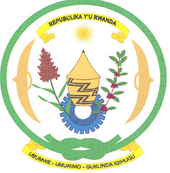OLPC Rwanda: Difference between revisions
No edit summary |
|||
| Line 39: | Line 39: | ||
== |
== In the News == |
||
Kigali, 3 January 2007 |
Kigali, 3 January 2007 |
||
Revision as of 18:37, 1 December 2008
| 2007 status: green | ||||
| green | ||||
| Repubulika y'u Rwanda République Rwandaise Republic of Rwanda | |
| http://upload.wikimedia.org/wikipedia/commons/2/29/LocationRwanda.png | |
| Capital | Kigali |
|---|---|
| Official languages | Kinyarwanda French English |
| Area | 26,338 km² |
| Population | |
| - 2005 estimate | 9,378,226 |
| - 2002 census | 8,128,553 |
| - Density | 320/km² |
| Education | |
| - Literacy (%) | 70.4 |
| - Compulsory Years | |
| - Compulsory Age | |
| - Pop. in School Age | |
| - Pop. in School | |
| GDP (PPP) 2005 est. | USD 13 billion |
| - Per capita | USD 1,500 |
| GDP (nominal) 2005 est. | USD 2 billion |
| - Per capita | |
| HDI (2004) | 0.450 (low) |
| Gini Index (1985) | 28.9 |
| Time zone | CAT (UTC+2) |
| Internet TLD | .rw |
| Calling code | +250 |
| More statistics... | |
About Rwanda
Rwanda, the land of one thousand hills, is known for its natural beauty and warm people, but also a recent past of human tragedy and violence. The country has begun embracing information technology as their main strategy for economic and social development as a part of Rwanda's Vision 2020 -- the long-term country development plan that aims to transform the country into a medium-level income country by 2020. Even before OLPC started their project in the country, bringing computer literacy to primary school students was a goal of their society in order to prepare their country for this new economy. OLPC just added to their effort the technology needed for operate in Rwanda's limited electrical infrastructure and average primary school size of 1500 students and expertise in how to unleash the creativity of the children through the XO.
5000 XO laptops have been donated 2007's Give One, Get One program. The machines have recently been deployed and are being used by students and teachers. Another 5000 will be arriving in late 2008.
The biggest strength of this project in the country is the incommensurable commitment of the people involved in the laptop initiative. From the the Honorable President Paul Kagame, who recently stated their commitment to saturate the school in the country with XOs in the next year. Rwanda is enthusiastic and supportive, of making the initiative a success.
Many languages are spoken in Rwanda, including Kinyarwanda, Swahili, French, and English.
Statistics
| Primary Language | ,|x|Language spoken::x}} |
| Number of Laptops | Number of manufactured laptops::16000 |
| Keyboard Layout | Keyboard::OLPC English Keyboard |
| Build | ,|x|Software release::x}} |
| Date(s) Arrived in Country | ,|x|Has received laptops on date::x}} |
| School Server | ,|x|School server status::x}} |
| Deployment Status | [[Deployment status::5K laptops have arrived.
5K more coming in November, 2008. Will teach in English, French and Kinyarwanda No School Server planned Much of the deployment will be off net. 96% of primary schools don't have electricity, no server or wireless network in the moment, average of 1k students per school and 70 per classroom. Powerpoint Presentation, Bootstrapping OLPC deployment in Rwanda, from Juliano Bittencourt & Brian Jordan, members of the OLPC Learning Team, who assited with this large-scale deployment.]] |
In the News
Kigali, 3 January 2007
Rwanda commits to “one laptop per child” initiative
In recognition of children being Rwanda’s most precious natural resource, the government of Rwanda has committed to provide one laptop per child to all primary school children within five years.
This commitment was confirmed as H.E. President Paul Kagame met with Prof. Nicholas Negroponte, founder and chairperson of One Laptop per Child (OLPC) at Urugwiro Village on Tuesday.
OLPC will provide test laptops plus support to fully test the concept at no cost in Rwanda, as well as coordinate knowledge exchange with other participating nations.
This initiative will strengthen the quality of already existing free and compulsory primary education, by adopting new tools for learning and engaging children more directly, both inside and outside school.
Furthermore, by moving to electronic format, a much wider body of knowledge will be made available to children than was previously possible or economically feasible with printed text books.
As part of its stated vision of transforming Rwanda into a knowledge-based economy by the year 2020, the government of Rwanda through the Ministry of Infrastructure, Ministry of Education, and the Minister of Science and Technology and Research in the President’s Office will collaborate with the One Laptop Per Child non-profit Association to realize the project.
